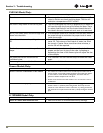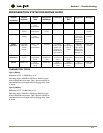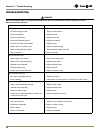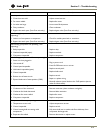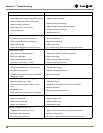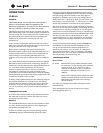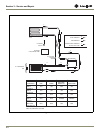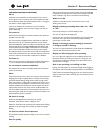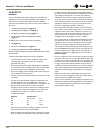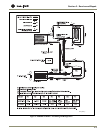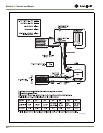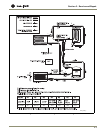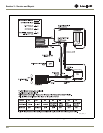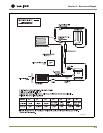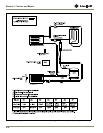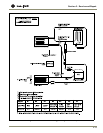
3-4
Section 3 - Service and Repair
CLRCO2175
GENERAL
The U-Line Model CLRCO2175 combines the best of Échelon
refrigeration and clear ice-making capabilities into a single unit. A
state-of-the-art microprocessor-based controller simplifies
operation and troubleshooting. There are four primary modes of
operation:
1. Ice Making and Refrigeration (Figure 2).
2. Ice Making and No Refrigeration (
Figure 3)
.
3. Refrigeration and No Ice Making (
Figure 4
).
4. Ice Harvest/Water fill (No Refrigeration Possible)
(
Figure 5
).
In addition, there are three sub modes of operation:
5. Off (
Figure 6
).
6. Water Fill - No Refrigeration (
Figure 7
).
7. Cleaning (No Refrigeration Possible) (
Figure 8
).
Review the following notes for general information before reading
the schematics.
These are some additional general notes and exceptions:
• The controller has a four-minute compressor minimum off-
cycle regardless of thermistor status, for compressor
protection and cycling.
• When making ice, the controller reads liquid line temperature
four minutes into the ice-making cycle to determine the length
of that ice-making cycle and subsequent harvest length.
• Once an ice-making cycle is initiated, it will continue through to
harvest regardless of the bin sensor.
• There is a three-minute water fill cycle when the unit is turned
on. Mode 6.
• In order to maintain adequate refrigerator temperature, the
unit will sometimes run in the refrigeration only mode, as
shown in Mode 3, even if the ice bin sensor is calling for ice. At
the end of each ice harvest, the controller checks the
refrigerator sensor and if it is warmer than the higher of 42°F,
or the set-point, it will go into refrigeration only mode. The
refrigerator must be at 42° or setpoint to make ice
continuously. Example:
Setpoint Temperature
38° 42° or lower ice
38° 45° no ice
55° 55° ice
55° 58° no ice
There is no fill cycle when ice-making re-initiates in this case
because the bin sensor has not been satisfied.
• When the initial three-minute fill cycle is complete, the unit will
enter ice making and refrigeration mode (1) if the bin is empty
or below the sensor. However, after the first slab of cubes is
harvested, the controller will follow the logic defined in 5 above
and realizing the refrigerator is too warm, will continue in
refrigeration only mode (3) until the requirement is satisfied.
Thus, upon start-up, the user will see one slab of ice dropped in
about 30 minutes, and then there will be no more ice until the
refrigerator reaches 42°F or set-point. (This may be two to
three hours depending on ambient conditions.)
• There will also be a water fill cycle after the ice bin has been
“full” and then calls to make ice again. This can occur when the
refrigerator side is off as shown in Mode 6, or when it is on,
which is shown in Mode 8. If the refrigerator side is on, when
the fill cycle initiates, it will remain on until the fill cycle is
completed, even if the refrigerator sensor is satisfied.
• The controller has a four-degree differential designed into it for
the refrigerator sensor, such that when it is set to 38°F, the
refrigerator will cool until the refrigerator sensor reads 36°F
and will not re-initiate refrigerator cooling until the sensor
reaches 40°F. So someone monitoring actual temperature (by
pressing WARMER momentarily) may see the refrigerator off
when the temperature is a degree warmer than set-point, or
refrigerator on when it is a degree below set-point. Refer to
Echelon Keypad.
• There is no high limit cut-out on this unit; however, if the liquid
line sensor were to go out of range (approximately 185°F) the
ice maker side of the unit will shut down. The refrigerator will
continue to run. When the temperature of the liquid falls back
in range, the unit will re-initiate operation. The unit will not
normally experience this condition up to 110°F, but conditions
such as door openings, heavy loading, restricted airflow, dirty
condenser or direct sunlight may contribute to reaching this
mode.
• Different from the earlier CLRCO2075, this unit uses two
relays to control the refrigeration valves. This means that the
valves will only be energized when needed.
• There is now a thermistor on the refrigerator evaporator that
will sense the evaporator plate temperature. This will allow the
unit to fully defrost based on temperature of the evaporator
plate during the defrost modes.



